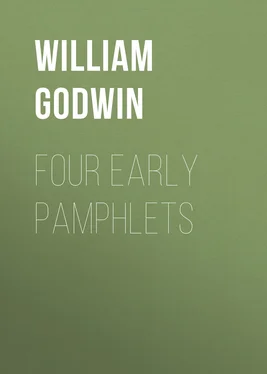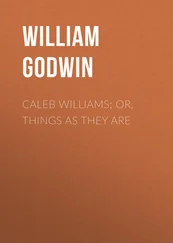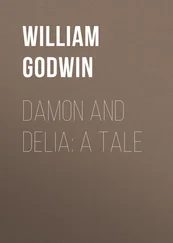William Godwin - Four Early Pamphlets
Здесь есть возможность читать онлайн «William Godwin - Four Early Pamphlets» — ознакомительный отрывок электронной книги совершенно бесплатно, а после прочтения отрывка купить полную версию. В некоторых случаях можно слушать аудио, скачать через торрент в формате fb2 и присутствует краткое содержание. Жанр: foreign_prose, Европейская старинная литература, на английском языке. Описание произведения, (предисловие) а так же отзывы посетителей доступны на портале библиотеки ЛибКат.
- Название:Four Early Pamphlets
- Автор:
- Жанр:
- Год:неизвестен
- ISBN:нет данных
- Рейтинг книги:4 / 5. Голосов: 1
-
Избранное:Добавить в избранное
- Отзывы:
-
Ваша оценка:
- 80
- 1
- 2
- 3
- 4
- 5
Four Early Pamphlets: краткое содержание, описание и аннотация
Предлагаем к чтению аннотацию, описание, краткое содержание или предисловие (зависит от того, что написал сам автор книги «Four Early Pamphlets»). Если вы не нашли необходимую информацию о книге — напишите в комментариях, мы постараемся отыскать её.
Four Early Pamphlets — читать онлайн ознакомительный отрывок
Ниже представлен текст книги, разбитый по страницам. Система сохранения места последней прочитанной страницы, позволяет с удобством читать онлайн бесплатно книгу «Four Early Pamphlets», без необходимости каждый раз заново искать на чём Вы остановились. Поставьте закладку, и сможете в любой момент перейти на страницу, на которой закончили чтение.
Интервал:
Закладка:
Secondly, I would observe that the principal ground of dispute between lord North and his present colleagues in administration, was done away by the termination of the American war. An impeachment of the noble lord for his past errors was perfectly out of the question. No one was mad enough to expect it. A vein of public spirit, diffusing itself among all ranks of society, is the indispensible concomitant of impeachments and attainder. And such a temper, I apprehend, will not be suspected to be characteristic of the age in which we live. But were it otherwise, the Rockingham connexion certainly never stood in the way of an impeachment, had it been meditated. And, exclusive of this question, I know of no objection, that applies particular to the noble lord, in contradistinction to any of the other parties into which we are divided.
But, in the third place, the terms upon which the coalition was made, form a most important article of consideration in estimating its merits. They are generally understood to have been these two; that the Rockingham connexion should at all times have a majority in the cabinet; and that lord North should be removed to that "hospital of incurables," as lord Chesterfield has stiled it, the house of lords. Surely these articles are the happiest that could have been conceived for preserving the power of administration, as much as may be, with the friends of the people. Places, merely of emolument and magnificence, must be bestowed somewhere. Where then can they be more properly lodged, than in the hands of those who are best able to support a liberal and virtuous administration?
I beg leave to add once more, in the fourth place, that, whatever the demerits of lord North as a minister may be supposed to have been, he is perhaps, in a thousand other respects, the fittest man in the world to occupy the second place in a junction of this sort. The union of the Rockingham connexion with the earl of Shelburne last year, was, I will admit, less calculated to excite popular astonishment, and popular disapprobation, than the present. In the eye of cool reason and sober foresight, I am apt to believe, it was much less wise and commendable. Lord Shelburne, though he has been able to win over the good opinion of several, under the notion of his being a friend of liberty, is really, in many respects, stiffly aristocratical, or highly monarchical. Lord Shelburne is a man of insatiable ambition, and who pursues the ends of that ambition by ways the most complex and insidious. The creed of lord North, whatever it may be, upon general political questions, is consistent and intelligible. For my own part, I do not believe him to be ambitious. It is not possible, with his indolent and easy temper, that he should be very susceptible to so restless a passion. In the heroical sense of that word, he sits loose to fame. He is undoubtedly desirous, by all the methods that appear to him honourable and just, to enrich and elevate his family. He wishes to have it in his power to oblige and to serve his friends. But I am exceedingly mistaken, if he entered into the present alliance from views of authority and power. Upon the conditions I have mentioned, it was a scheme, congenial only to a man of a dark and plotting temper. But the temper of lord North is in the highest degree candid, open and undisguised. Easy at home upon every occasion, there is not a circle in the world to which his presence would not be an addition. It is calculated to inspire unconstraint and confidence into every breast. Simple and amiable is the just description of his character in every domestic relation; constant and unreserved in his connexions of friendship. The very versatility and pliableness, so loudly condemned in his former situation, is now an additional recommendation. Is this the man, for whose intrigues and conspiracies we are bid to tremble?
Another charge that has been urged against the coalition, is, that it was a step that dictated to the sovereign, and excluded all, but one particular set of men, from the national councils. The first part of this charge is somewhat delicate in its nature. I shall only say respecting it, that, if, as we have endeavoured to prove, there were but one connexion, by which the business of administration could be happily discharged, the friend of liberty, rejoicing in the auspicious event, will not be very inquisitive in respect to the etiquette, with which they were introduced into the government. In the mean time, far from intending an exclusion, they declared publicly, that they would be happy to receive into their body any man of known integrity and abilities, from whatever party he came. The declaration has never been contradicted.—Strangers to the remotest idea of proscription, they erected a fortress, where every virtue, and every excellence might find a place.
The only remaining objection to the coalition that I know of, that it shocks established opinions, is not, I think, in itself, calculated to have much weight, and has, perhaps, been sufficiently animadverted upon, as we went along, in what has been already said. The proper question is, was it a necessary step? Was there any other way, by which the country could be redeemed? If a satisfactory answer has been furnished to these enquiries, the inevitable conclusion in my opinion is, that the more it mocked established opinions, and the more intellectual nerve it demanded, the more merit did it possess, and the louder applause is its due.
I am not inclined to believe, that a majority of my countrymen, upon reflection, have disapproved this measure. I am happy to perceive, that so much of that good sense and manly thinking in public questions, that has for ages been considered as the characteristic quality of Englishmen, is still left among us. There can be nothing more honourable than this.—By it our commonalty, though unable indeed to forestal the hero and the man of genius in his schemes, do yet, if I may be allowed the expression, tread upon his heels, and are prepared to follow him in all his views, and to glow with all his sentiments.
Sensible however, that in the first blush of such a scheme, its enemies must necessarily find their advantage in entrenching themselves behind those prejudices, that could not be eradicated in a moment, I was willing to wait for the hour of calmness and deliberation. I resolved cooly to let the first gush of prepossession blow over, and the spring tide of censure exhaust itself. I believed, that such a cause demanded only a fair and candid hearing. I have endeavoured to discharge my part in obtaining for it such a hearing. And I must leave the rest to my readers.
Among these there probably will be some, who, struck with the force of the arguments I have adduced on the one hand, and entangled in their favourite prejudices on the other, will remain in a kind of suspence; ashamed to retract their former opinions, but too honest to deny all weight and consideration to those I have defended. To these I have one word to say, and with that one word I will conclude. I will suppose you to confess, that appearances, exclusive of the controverted step, are in a thousand instances favourable to the new ministers. They have made the strongest professions, and the largest promises of attachment to the general cause. To professions and promises I do not wish you to trust. I should blush to revive the odious and exploded maxim, not men, but measures. If you cannot place some confidence in the present administration, I advise you, as honest men, to do every thing in your power to drive them from the helm. But you will hardly deny, that all their former conduct has afforded reasons for confidence. You are ready to admit, that, in no instance, but one, have they committed their characters. In that one instance, they have much to say for themselves, and it appears, at least, very possible, that they may have been acted in it, by virtuous and generous principles, even though we should suppose them mistaken. Remember then, that popularity and fame are the very nutriment of virtue. A thirst for fame is not a weakness. It is "the noble mind's distinguishing perfection." If then you would bind administration by tenfold ties to the cause of liberty, do not withdraw from them your approbation till they have forfeited it, by betraying, in one plain and palpable instance, the principles upon which they have formerly acted. I believe they need no new bonds, but are unchangeably fixed in the generous system, with which they commenced. But thus much is certain. If any thing can detach them from this glorious cause; if any thing can cool their ardour for the common weal, there is nothing that has half so great a tendency to effect this, as unmerited obloquy and disgrace.
Читать дальшеИнтервал:
Закладка:
Похожие книги на «Four Early Pamphlets»
Представляем Вашему вниманию похожие книги на «Four Early Pamphlets» списком для выбора. Мы отобрали схожую по названию и смыслу литературу в надежде предоставить читателям больше вариантов отыскать новые, интересные, ещё непрочитанные произведения.
Обсуждение, отзывы о книге «Four Early Pamphlets» и просто собственные мнения читателей. Оставьте ваши комментарии, напишите, что Вы думаете о произведении, его смысле или главных героях. Укажите что конкретно понравилось, а что нет, и почему Вы так считаете.












